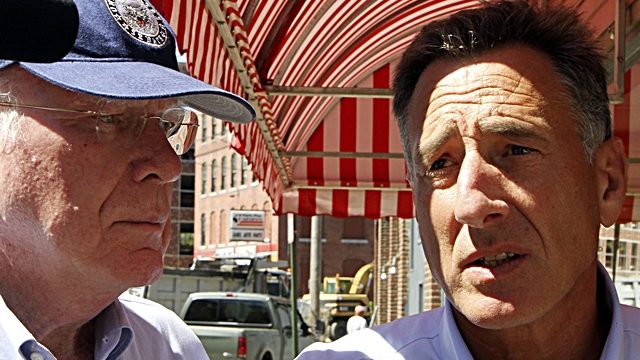Leahy pushes transparency as Shumlin protects single-payer secrets

NO MORE SECRETS?: Sen. Patrick Leahy, left, wants to make it harder for government officials to reject freedom-of-information requests. Gov. Peter Shumlin wants less transparency.
By Bruce Parker | Vermont Watchdog
Vermont’s senior U.S. senator wants more transparency in government. Unfortunately, Vermont’s governor insists on less.
Sen. Patrick Leahy, D-Vt., introduced legislation Tuesday that would make it harder for government officials to conceal information from the public.
Leahy’s bill, the FOIA Improvement Act of 2014, helps citizens peer inside government by closing a loophole in one of nine exemptions commonly used to reject freedom of information requests. The legislation also requires agencies to adopt a “presumption of openness” when responding to FOIA requests.
“The Freedom of Information Act is one of our nation’s most important laws, established to give Americans greater access to their government and to hold government accountable,” Leahy said in a statement.
An analysis released by Leahy’s office says agencies or officials that cite the deliberative-process privilege or the attorney work-product privilege when faced with FOIA requests will be forced to disclose information.
Whereas Vermont’s senator is leading the push for greater transparency, Vermont Gov. Peter Shumlin, also a Democrat, continues to hide information about the state’s single-payer health care system.
Under Act 48, the state’s universal health care legislation, Shumlin is bound to disclose the costs of single-payer and the means by which the state will pay for it — information the governor continues to conceal from the public.
While many prominent state lawmakers have blasted the governor for “violating the law,” state Rep. Cynthia Browning, D-Arlington, fired off a FOIA request demanding that the governor release the information to the public. The governor refused her records request, and Browning sued.
“They did claim executive privilege that governors should be able to get reports and have discussions and deal with matters privately as they are making decisions,” Browning told Watchdog.org.
Browning said her back-and-forth with top officials has yet to produce compliance with Act 48.
“There are four letters: There’s my original letter requesting it, and Michael Costa denying it. And then I wrote a letter appealing his denial, and then Mr. Spaulding wrote a letter denying my appeal,” she said.
Brady Toensing, vice chairman of the Vermont GOP, said the governor is concealing information because the administration doesn’t know how to pay for single-payer health care.
“They don’t want to have to turn those documents over and show they have no idea how to make the numbers work,” Toensing told Watchdog.org.
“It’s a safe bet to assume that if they had documents that looked good, these privilege claims would be waived and they would make them public.”
Toensing, a lawyer, said that while Vermont’s public records statute allows secrecy to protect individual clients from personal harm, it is not appropriate for state lawmakers or officials to use the statute to shield themselves from political harm.
“The government routinely waives privilege claims when the information is deemed politically beneficial,” he said. “But they invoke these privileges to deny public access to politically harmful information.”
More than 18 months after state law required Shumlin to disclose his single-payer financing plan, the administration is seeking a consultant who can find a way to pay for Green Mountain Care — commonly estimated between $1.8 billion and $2.6 billion.
Although Leahy’s proposed revisions to the Freedom of Information Act would apply only to federal officials, the Shumlin administration finds itself swimming against a trend towards greater openness in government.
U.S. Sen. John Cornyn, R-Texas, a co-sponsor of the FOIA Improvement Act of 2014, called open government “the hallmark of a healthy democracy.” He added that the American people “have a fundamental right to know what their government is doing.”
Contact Bruce Parker at bparker@watchdog.org







